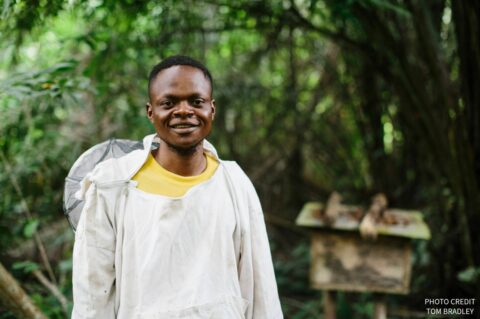
Remy , 24. Leprosy Settlement, Kongo Central
Remy lives in a small leprosy settlement of just a few houses, built by the government in the 1980s for those affected by leprosy. It is not too far from an old hospital in the forest outside of a village, and the settlement was intended for those that needed to stay short term while taking MDT.
Families now live here permanently, and TLM has since built a well here, and helps with wound dressings etc. Remy was born here.
He lives with his parents and two siblings. There are 7 brothers and sisters in total, though 4 live away from home. He’s the second youngest. His father, Fabien (also pictured), 70 was also affected by leprosy.
He’s finished high school, and does various jobs at home – farming cassava, palm oil, and honey. Beekeeping was introduced in this small village in 2011 by TLM, and they are known for selling honey. “I have qualifications, but to start off jobs you need money to pay bribes.”
Remy has done technical studies in electronics, but wasn’t able to touch things in the workshop because of weakness in his hands. It was in 2013 that he got the first symptoms, while studying at secondary school.
Since his family were very familiar with leprosy, he was taken straight to the local hospital and diagnosed. “As I was born here, I know the disadvantage of leprosy, and I lost hope. I thought with this, I’ll lose sensitivity and not be able to do anything with my life. I was fearful that it would eventually kill me.” He no longer thinks like this about leprosy, having been educated better.
“At school none of my classmates would sit near me. I was studying in the nearby town of Nsioni, and it was difficult for me to continue going to school at this time.”
“When I started taking MDT my urine became red, and my skin went darker and dried up. But after two months my hands became strong again. They’re still strong now.”
Remy does have anaesthesia on his feet, and so is vulnerable to wounds. He’s had ulcers on his feet before and felt very ashamed and embarrassed because of this. “It’s another barrier to me getting a job.” He also has anaesthesia on his hands, so has to be particularly careful there too.
Two of his brothers, who don’t live here currently are also affected – one in Lukula, farming, and another in the nearby Angolan state of Cabinda.
TLM provided Remy and his father Fabien with beekeeping equipment, in particular the protective jacket, hat and gloves. There are 29 hives in total in the community. Fabien was trained by TLM in beekeeping in 2017. They sell the honey for $5 a litre. I bought a bottle and it is delicious – strong and earthy in flavour!